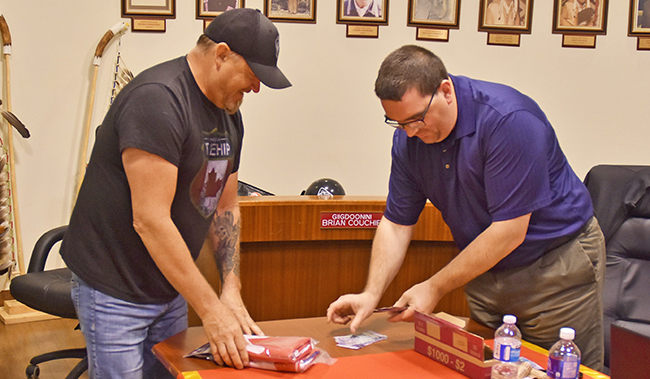Robinson Huron Treaty Annuity Day in Nipissing First Nation

By Kelly Anne Smith
NIPISSING FIRST NATION – People were sauntering into the Council Chambers/Gimaa Gikdiwin in Garden Village, nodding hi, taking a number and having a seat. It seemed to be a chance for people to catch up on their goings on. There were simultaneous conversations, laughter, greetings and farewells. It was Treaty annuity day on May 31st. Another date was held in Duchesney Village on Nipissing First Nation.
Chief Scott McLeod was the 79th annuity recipient and there had been 15 Elders there before him as well. “Hi Chief, these are for you,” said Corinna Depotier, Manager Responsible for Treaty in the Ontario region, Indigenous and Northern Affairs Canada. She handed him two wrapped up flags.
“You haven’t collected for a while,” said assistant Christine Hughes. Chief McLeod replied, “Thank you,” as he took his accumulated annuity in big bills from Gabriel Plante, an assistant to the Treaty team led by Depotier. He collected 15 years of annuity – $60.
In a later interview, Depotier explained the protocol of Treaty officers. “We have a Treaty pay list. When the members come up, we ask them for their band number because that Treaty pay list is tied to the individual band list. That’s how we know that they are Treaty. An example is Wikwemikong is unceded, so the original members did not sign the Treaty. They wouldn’t be eligible for Treaty annuity payments. They could have other members, newer members possibly that did sign that Treaty so their dependants are eligible to apply for Treaty annuity payments.”
“Some of the band members that are on Manitoulin Island are Treaty and annuity under the Robinson Huron Treaty and some are not because they are under the Manitoulin Treaty and that does not pay annuity payments.
We have about a hundred Treaty events this year. Each event could have a different Treaties, calling for different things. For example, in Treaty 3, we have to present them with fishing nets and ammunition along with the flags.”
Under the Robinson Huron Treaty, additional to a yearly Treaty payment of four dollars, the Nipissing First Nation Chief receives two flags. “Part of the Treaty does call for the presentation of the Union Jack flag as well as the Canadian flag.”
This reporter asked a police constable if she was receiving her annuity or was there as an officer. She looked serious and turned her head from side to side and said, “Well, just look at this crowd.” The line-up of sitting Elders and Youth were quiet for a second and then everyone broke out laughing. Constable Chantal Larocque of Anishinabek Police Service explained that police presence was usual on Treaty day. “It’s done especially for picking up at the bank. The odd time there has been trouble, but not here.”
Chief McLeod wondered where the RCMP were. “It’s part of the deal, in uniform, with their horse outside.”
Depotier’s department coordinates the invitations for security. “The department has been working with the RCMP to engage them and to have them participate in the Treaty events. I let our colleagues know every time a Chief or community member requests or asks why there has not been RCMP presence. It’s different here in Ontario. We have the OPP, Treaty Three Police, Nishnawbe-Aski Police Service, and the Anishinabek Police Service. We have to have security with us to protect the crown’s money.”
Eligible Indigenous people in the Robinson Huron Treaty area receive four dollars per year.


